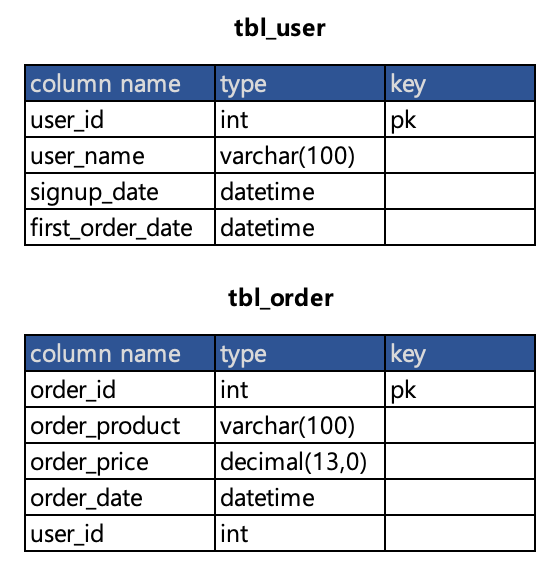
M+3 의 '재구매율' 이란?
예를 들어 1월의 (신규) 구매자들 중에 4월달에도 재구매를 한 비율을 뜻한다.
M+(1,2,3) 의 '재구매율' 이란?
예를 들어 1월의 (신규) 구매자들 중에 2월부터 4월까지 재구매를 한 비율을 뜻한다.
이를 SQL를 이용하여 계산해보도록 하자.
1. 아래와 같이 tbl_uesr, tbl_order 라는 테이블이 있다고 가정합니다.

2. 2019년1월 부터 2019년 12월까지 12개월을 대상으로 'M+3 재구매율'
select base_mon.now_dt
, count(distinct base_mon.user_id) as cnt_curmon
, count(distinct future_mon.user_id) as cnt_nextmon
, count(distinct future_mon.user_id)/count(distinct base_mon.user_id) as rate
from (
select date_format(first_order_date, '%Y-%m') as now_dt
, user_id
from tbl_user
where firt_order_date >= '2019-01-01' and first_order_date < '2020-01-01'
) base_mon
left join (
select date_format(date_sub(created, interval 3 month), '%Y-%m') as future_dt
, user_id
from tbl_order
where order_date >= '2019-04-01' and order_date < '2020-04-01'
) future_mon on base_mon.now_dt = future_mon.future_dt
and base_mon.user_id = future_mon.user_id
group by base_mon.now_dt;3. 2019년1월 부터 2019년 12월까지 12개월을 대상으로 'M+(1,2,3) 재구매율'
select new_user.base_mon
, count(distinct new_user.user_id) as cnt_base_mon
, count(distinct tbl_order.user_id) as cnt_m123
, count(distinct tbl_order.user_id) / count(distinct new_user.user_id) as retention
from (
select date_format(first_order_date, '%Y-%m') as base_mon
, date_foramt(date_add(first_order_date, interval 1 month), '%Y-%m-01') as start_dt
, date_foramt(date_add(first_order_date, interval 4 month), '%Y-%m-01') as end_dt
, user_id
from tbl_user
where first_order_date >= '2019-01-01' and first_order_date < '2020-01-01'
) new_user
left join tbl_order on tbl_order.user_id = new_user.user_id
and tbl_order.order_date between new_user.start_dt and new_user.end_dt
group by new_user.base_mon;
'분석 > 데이터분석' 카테고리의 다른 글
| 애플뮤직 A/B Test ? (0) | 2021.10.02 |
|---|---|
| 일련번호(날짜) 생성 in Presto (0) | 2021.04.20 |
| DBeaver 로 AWS Athena 접속하기 (0) | 2020.06.09 |
| with statement in SQL (0) | 2020.01.29 |
| How To Calculate Cohort Retention in SQL (0) | 2020.01.07 |



